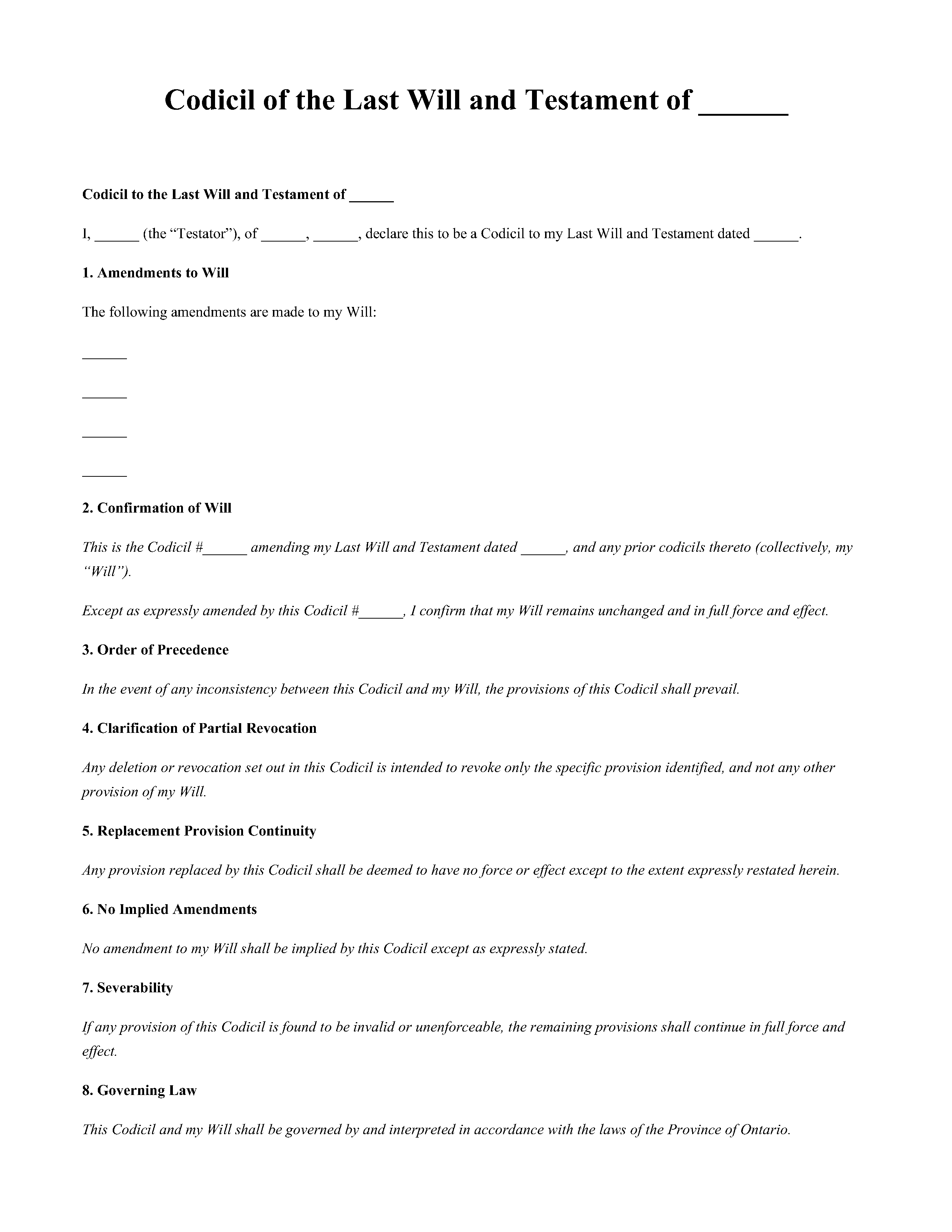Free Codicil to the Last Will and Testament in Ontario Template
A formal legal document used to modify, add to, or revoke specific provisions of an existing Last Will and Testament. Ideal for changing executors, updating beneficiaries, or adding specific bequests. Includes the necessary legal language to reaffirm the original Will and satisfy witness requirements.

Meet with a notary public and draft your document
Meet a licensed professional online to draft your document. Get it completed in minutes.
 $99.95
$249.00
• Save: $149.05 (60%)
$99.95
$249.00
• Save: $149.05 (60%)

Featured NotaryPro Expert in Toronto

How it Works
Fill out our simple
online form with your
information.
Review and approve
the generated
document.
Once your document
is ready, you can
Notarise!
Meet with a notary public and draft your document
Meet a licensed professional online to draft your document. Get it completed in minutes.
 $99.95
$249.00
• Save: $149.05 (60%)
$99.95
$249.00
• Save: $149.05 (60%)

Featured NotaryPro Expert in Toronto
Contents
-
What is a Codicil to Your Will?
-
Updates You Can Make with a Codicil
-
Legal Requirements for a Codicil in Ontario
-
Who Can Witness a Codicil?
-
Is It Legal to Have a Codicil Witnessed Online in Ontario?
-
Sign Your Codicil and Have it Witnessed Online
-
How to Draft a Codicil in Ontario
-
Can a Will Have Multiple Codicils?
-
When Should I Create a New Will?
-
Final Thoughts: Draft Your Codicil Today
-
Frequently Asked Questions
What is a Codicil to Your Will?
A Codicil is a legal document that is used to update your Last Will and Testament. With a Codicil, you can add, remove, or modify parts of your Will, so you don’t need to write an entirely new document. You’d typically use a Codicil to make minor changes, like naming a new beneficiary or adding a new asset for distribution.
In Ontario and most Canadian provinces, a Codicil has the same legal requirements as a Will. These include the requirement that two witnesses sign it for it to be valid. Once you and your witnesses sign your Codicil, you can attach it to your Will and store it with your estate planning documents.
Note: A Codicil is best for minimal changes. If your Will requires extensive updates, it’s best to write a new one.
Do you have Questions about your Codicil to the Last Will and Testament Document ?
Updates You Can Make with a Codicil
Updating a Will ensures your beneficiaries remain current and your assets are distributed according to your wishes. You can use a Codicil to make the following changes to your Will:
- Updating a Guardian or Executor: If you don’t want someone in your Will to act as a guardian or executor.
- Adding or Removing a Beneficiary: If your family situation or relationships change, you can add or remove a beneficiary.
- Adding, Removing, or Updating Asset Distribution: You can change which of your assets are distributed and how.
- Updating Gifts: You can add or remove gifts, or change the amount distributed as you wish.
Legal Requirements for a Codicil in Ontario
For a Codicil to be legally valid, it should adhere to the guidelines below:
- Correct Execution: You need to execute your Codicil with the same formalities as your Will (it must be dated, signed, and witnessed).
- Consistency with the Will: A Codicil must identify and override specific provisions of the original Will, without creating ambiguity or unintended conflicts.
- Witnessing and Signing: Two witnesses must witness you sign the Codicil; they must be 18 or older and mentally capable.
- Mental Capacity: You must have the mental capacity to comprehend how a Codicil works and the implications of any changes made to your Will.
- Free of Coercion and Undue Influence: You must create a Codicil freely, without anyone manipulating or coercing you.
Who Can Witness a Codicil?
You must have two witnesses witness you signing your Codicil, as with your Will. They must meet the criteria below:
- Be at least 18 years old
- Be mentally capable
- Not be a beneficiary under the Will or Codicil
- Not be the spouse of a beneficiary (otherwise, the gift to that beneficiary may be void)
Is It Legal to Have a Codicil Witnessed Online in Ontario?
In Ontario, the remote witnessing of a Codicil is legally permitted under the same framework that allows remote witnessing of Wills. Amendments to The Succession Law Reform Act (via Bill 245) allow Wills and related documents (including codicils) to be witnessed with audio-visual communication technology.
The testator and witnesses must sign at the same time, and at least one witness must be a Law Society licensee.
Sign Your Codicil and Have it Witnessed Online
You don’t have to deal with the hassle of coordinating a meeting with two separate witnesses to have your Codicil witnessed. All you need to do is print your Codicil and join a video call—we provide both witnesses.
Ontario Codicils must be signed with wet ink, so we’ve made the process digital for your convenience. Here’s how you can have your physical Codicil witnessed online, from any connected device with NotaryPro:
- You sign a printed copy of your Will with wet ink on a video call
- Your witnesses watch you sign, and sign their own copy
- NotaryPro stamps the witnessed copy and mails it to you
- You staple the copy you signed to the witnessed copy mailed to you
How to Draft a Codicil in Ontario
Drafting a Codicil to a Will is simple with NotaryPro’s free Codicil template. Essentially, you need to explain which parts of your Will you’re changing in your Codicil. Be clear about each of the changes you’d like to make.
It’s best to give as many details as possible — for example, use full legal names and describe your assets in detail. Your Codicil should also include a statement that says anything that’s in your Will, and not mentioned in your Codicil, will remain valid. Below are some specific details you’ll need to provide in a Codicil:
- Your full name
- The city and province in which you live
- The date of your last Will
- Provisions you’re adding
- Provisions you’re removing
- Provisions you’re replacing
- Your signature and the date
- The city in which you signed
- The signatures of two witnesses and the city in which they signed
- Your witnesses’ names, addresses, and occupations
Can a Will Have Multiple Codicils?
Yes, you can have multiple Codicils to your Will; there’s no legal limit to the number of Codicils you can create. However, too many Codicils can make your Will difficult to interpret. Sometimes, creating a new Will is best to avoid confusion and conflict between family members.
When Should I Create a New Will?
If the changes you need to make to your Will are significant, rewriting the document might be easier than adding a Codicil. You may want to update your Will in the following situations:
- Moving to a Different Province: Each province has its own legislation regarding Wills, so your Will may need many updates if you move to another province.
- A Birth or Adoption in Your Family: Unless you’ve accounted for unborn children in your Will, you might want to create a new Will when a new child joins your family.
- Getting Married: In many Canadian provinces, getting married can impact the validity of your Will unless it has a “contemplation of marriage” clause.
- In Ontario, marriage no longer revokes a Will, but it can still necessitate updates.
- Changes to Romantic Relationships: If you’re not married, but have entered or left a romantic relationship, you may want to create a new Will to reflect this.
- Getting Divorced: In most provinces, divorce generally revokes gifts and executor appointments to a former spouse, but other provisions in the Will typically remain valid.
- Significant Changes to Assets: If there are significant changes to your assets, a new Will may be best for clarity.
- Having Many Codicils: If you’ve already made several Codicils to your existing Will, creating another one could make your Will too complicated.
Note: It’s best to seek legal advice from a licensed professional for estate planning and significant changes to your estate.
Final Thoughts: Draft Your Codicil Today
Your Will is one of the most important documents you can create. As life evolves, your estate plan should, too. Whether you’ve experienced a change in family relationships, family structure, or assets, keeping your Will up to date is essential.
With a Codicil, you can make minor updates to your Will without drafting a new one. Making these updates is easier than ever before with NotaryPro.
In addition to drafting a Codicil with our template, you can have your Codicil witnessed entirely online with our Virtual Witnessing Service in minutes. Take control of your estate plan today, because you deserve peace of mind.
Frequently Asked Questions
In Ontario, a Codicil may be valid without witnesses if it qualifies as a holograph Codicil. A holograph Codicil must be entirely handwritten and signed by the testator. Although holograph Codicils are legally valid, they’re more likely to lead to interpretation and probate complications.
It’s best to store a Codicil with your original Will and to disclose the location to your executor. Keeping them together helps prevent confusion and ensures your Codicil is easily found and applied during probate.
Yes, an Affidavit of Execution is required for probate, and many Canadian Wills go through probate.
When a Will is probated in court, the executor receives the authority to carry out the wishes within it. Institutions often require a probated Will before releasing assets, and the probate process confirms that a Will is valid.
NotaryPro automatically includes an Affidavit of Execution with online Codicil witnessing services.
A Codicil cannot go through probate on its own in Ontario. If probate is required, your Codicil is submitted with your original Will as part of the probate application. The court reviews both documents to determine your final intentions.
No, there is no limit to the number of Codicils you can add to your Will. But too many Codicils can make interpreting your Will confusing and complicate its execution. If you have several Codicils, you may want to create a new Will to ensure your wishes are executed as intended.
Yes, NotaryPro’s virtual witnessing services are legally recognized. NotaryPro’s documents are accepted by national and international institutions and authorities, including the Government of Canada and Service Ontario.